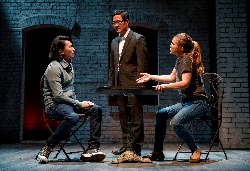
Cardinal
Second Stage
Snapshot Review: Never Makes Any Real Impression
Jena Tesse Fox, Reviewer
Cardinal, which opened last week at Second Stage, never seems quite sure of what it is supposed to be: If it’s a black comedy, there aren’t a lot of laughs. If it’s a drama, it’s not a particularly emotional one. The story could be compelling, and it raises some interesting issues, but Greg Pierce’s script is so thin that it never makes any real impression.
The story, such as it is, follows a young woman’s return to her upstate New York hometown, where she pitches an idea to the mayor to paint the downtown area cardinal red. The town used to be a thriving blue-collar community, but its factory has closed down and the whole area is struggling. Lydia, our heroine, studied urban planning in college and has since been living in Brooklyn and believes that her idea will attract visitors who want to see the all-red neighborhood and revitalize the town with tourism dollars. She gets her way, and the rest of the play examines the fallout as locals adjust to becoming tourist attractions, and a Chinese tour company from Manhattan cashes in on her idea by bringing in Chinese tourists, which the town doesn’t appreciate.
Pierce also wrote Slowgirl, which ran at Lincoln Center a few years back, as well as the book and lyrics for Kid Victory at the Vineyard, and those shows similarly dealt with protagonists who were sometimes hard to sympathize with, much less like, but who revealed complex layers as the story went on. There isn’t a lot of complexity in Cardinal and there aren’t a lot of layers to reveal anything very interesting. Is the play suggesting that small towns need rescuers from big cities, or is the play suggesting that educated people who try to use their education to improve a small community will only wind up destroying what makes that community special? Is the play suggesting that ambitious women are incompetent and destructive? Is the play suggesting that the only way women get their way is by seducing powerful men? Is the play suggesting that bringing Asian business people into small towns will destroy those communities? (That’s arguably the most offensive angle the play seems to take, but whether the thinly veiled racism or sexism is worse is up for debate.)
In short, the script is very muddled at best and offensive at worst, and it really should have had another few drafts before a production at this level of a theater. It isn’t funny and it isn’t moving and it isn’t particularly profound. Kate Whoriskey’s direction doesn’t add much depth to the the story, but she does keep the energy up as much as possible and the pace moving.
The cast does their best with what they’re given to work with. Anna Chlumsky, who has done some excellent comic work on stage and on TV (and has the Emmy nominations to prove it) doesn’t really seem to have much to do with this role. She veers between villainy and childlike exuberance from scene to scene—which could work if this were a thriller where a character’s motivations were meant to be unclear, but in a black comedy or drama or whatever, we should start to get some sense of why a character is really doing what she’s doing at some point. This isn’t Chlumsky’s fault so much as Pierce’s and Whoriskey’s. She just hasn’t been given strong enough material to work with or strong enough direction.
As the town’s mayor, Adam Pally gets some better material to work with and actually has some good moments of emotional power, especially when he talks about his battles with depression and suicidal thoughts. He treats this very sensitive material with the gravity it deserves…but then it all gets ripped to shreds when he jumps up and down like a child throwing a tantrum. It sort of encapsulates the entire show: Just when a moment has some depth and we’re starting to feel some sympathy or empathy for a character, an out-of-nowhere element destroys it.
The best performance of the evening comes from Becky Ann Baker as a local businesswoman who sees her community changing and doesn’t know how to change with it. The role could easily have been dismissed as a caricature of small-town American life, but she really gives it some depth and emotional resonance as the character struggles to hold on to her values while accepting the reality of changing times. She isn’t presented as a hick or a redneck, but someone who is seeing everything that she knows disappear around her. It’s a devastating performance, and one that should be remembered at awards time in the spring. Alex Hurt plays her developmentally disabled son and gets some good moments as well, and with stronger direction his performance could have been a lot more powerful. Stephen Park and Eugene Young round out the cast as a father and son business team from Manhattan’s Chinatown, and neither one really gets much to do beyond be a plot point.
Derek McLane’s set is fine and effective—industrial bricks with red lights on them (courtesy of Amith Chandrashaker) to convey the literal changing colors of the town. It’s a nice effect, and a good subtle touch in a show that doesn’t have a lot of subtlety.
For more information, visit Second Stage.
© Copyright 2018 by Jeff Myhre, PhD, Editor. No part of this publication may be reproduced without written consent. Produced using Ubuntu Linux.
 Friday, December 12, 2025
Friday, December 12, 2025